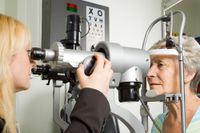
Studies show there is a gender gap in eye disease; women are more likely than men to experience sight-threatening conditions such as age-related macular degeneration — AMD — cataracts, and glaucoma. In support of Healthy Vision Month in May, Digby Eye Associates and the American Academy of Ophthalmology remind women to make vision a top priority.
Why Women Face Higher Risk of Blindness Than Men
 Women make up 65 percent of AMD cases, 61 percent of glaucoma and cataract cases, and 66 percent of blind patients. Why the inequity? There are a few theories. On average, women live longer, and many eye problems are age-related. Some eye conditions — such as dry eye — are more common in women, young and old. Social and economic factors affect women’s access to eye care, especially in developing countries.
Women make up 65 percent of AMD cases, 61 percent of glaucoma and cataract cases, and 66 percent of blind patients. Why the inequity? There are a few theories. On average, women live longer, and many eye problems are age-related. Some eye conditions — such as dry eye — are more common in women, young and old. Social and economic factors affect women’s access to eye care, especially in developing countries.
Whatever the cause, there are a few unique vision problems women need to watch out for more than men. Dry eye occurs at double the rate in postmenopausal women. Generally, women are more susceptible to autoimmune diseases than men, many of which affect vision — such as lupus, Sjögren’s syndrome, and hyperthyroidism. Also, pregnancy can cause vision changes due to hormone fluctuations.
How to Maintain Your Eye Health
The good news is most vision loss is preventable. Follow these five simple steps to take control of your eye health today:
- Get a comprehensive medical eye exam at age 40. Early signs of disease or changes in vision may begin at this age. An exam is an opportunity to carefully examine the eye for diseases and conditions that may have no symptoms in the early stages.
- Know your family history. Certain eye diseases can be inherited. If you have a close relative with macular degeneration, you have a 50 percent chance of developing this condition. A family history of glaucoma increases your glaucoma risk by four to nine times. Talk to family members about their eye conditions. It can help you and your ophthalmologist evaluate your risk.
 Eat healthy foods. A diet low in fat and rich in fruits, vegetables, and whole grains, benefits the entire body — including the eyes. Eye-healthy food choices include citrus fruits, vegetable oils, nuts, whole grains, dark green vegetables, and cold-water fish.
Eat healthy foods. A diet low in fat and rich in fruits, vegetables, and whole grains, benefits the entire body — including the eyes. Eye-healthy food choices include citrus fruits, vegetable oils, nuts, whole grains, dark green vegetables, and cold-water fish.- Stop smoking. Smoking increases the risk for eye diseases such as cataract and age-related macular degeneration. Smoking also raises the risk for cardiovascular diseases, which can indirectly influence your eye health. Tobacco smoke — including second-hand smoke — also worsens dry eyes.
- Wear sunglasses. Exposure to ultraviolet UV light raises the risk of eye diseases — including cataracts, fleshy growths on the eye, and cancer. Always wear sunglasses with 100 percent UV protection and a hat while enjoying time outdoors.
To learn more ways to keep your eyes healthy, visit the American Academy of Ophthalmology’s EyeSmart® website. To schedule your comprehensive eye exam today, please contact our Greensboro office at (336) 230-1010 or our office High Point office at (336) 454-2020. Also, learn more about eye issues — such as cataracts, dry eye, and blindness — and our services online.
Dr. Erin Fontaine joined Digby Eye Associates in 2014. She is a native of Raleigh, NC, and a graduate of North Carolina State University where she received her Bachelor of Science Degree in Biochemistry, Biological Sciences, and Chemistry with a minor in Genetics. She then earned her Doctor of Optometry Degree from the University of Alabama at Birmingham. She completed a residency at Wm. Jennings Bryan Dorn VA Medical Center in Columbia, SC, where she gained experience in comprehensive eye care, diagnosing and managing ocular diseases, and completing low vision exams.
At Digby Eye Associates Dr. Fontaine has continued to demonstrate her expertise in providing comprehensive eye care and in managing nearsightedness, farsightedness, and presbyopia. She excels in fitting daily and extended wear contact lenses. With the latest technologically advanced lens designs, she recommends the lens best suited for her patient’s lifestyle. She has expertise in diagnosing and managing cataracts and glaucoma. Dr. Fontaine regularly assists DEA surgeons with the post-operative management of their surgical cases.
In her free time, Dr. Fontaine and her husband enjoy sporting events, outdoor activities, and cooking. They also enjoy spending time with their young son, Landon, and are expecting their second baby in the summer of 2019.
About the Business
Have a question? Ask the experts!
Send your question

